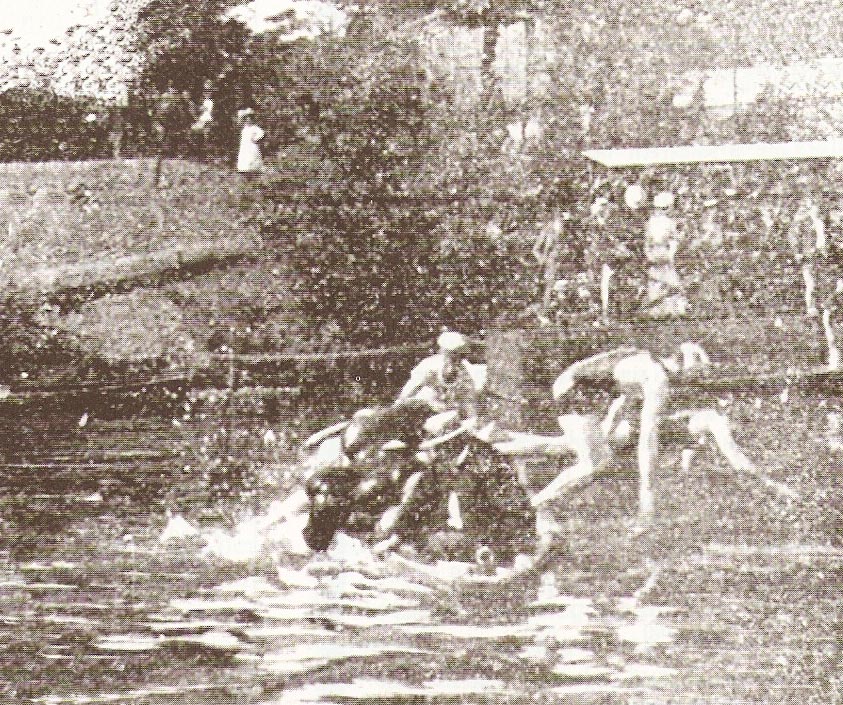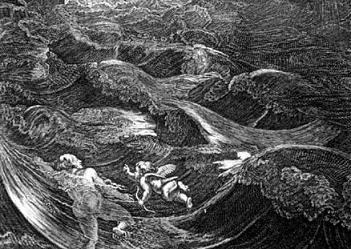|
Swimming At The 1900 Summer Olympics – Men's 200 Metre Obstacle Event
The men's 200 metre obstacle event was an obstacle swimming event in the 1900 Summer Olympics held in Paris. It was held on 11 August and 12 August 1900. Twelve swimmers from five nations competed. The event was won by Frederick Lane of Australia, with Otto Wahle of Austria second and Peter Kemp of Great Britain third. Lane had already won the 200 metre freestyle (with no obstacles). Background This was the only appearance of obstacle swimming at the Olympics. Competition format There were three obstacles throughout the 200 metre course. Swimmers had to climb over the first two (a pole and a row of boats), and swim under the third (another row of boats). This swimming event used freestyle swimming Freestyle is a category of Swimming (sport), swimming competition, defined by the rules of the International Swimming Federation (FINA), in which competitors are subject to a few limited restrictions on their swimming stroke. Freestyle races ar ..., which means ... [...More Info...] [...Related Items...] OR: [Wikipedia] [Google] [Baidu] |
Seine
) , mouth_location = Le Havre/Honfleur , mouth_coordinates = , mouth_elevation = , progression = , river_system = Seine basin , basin_size = , tributaries_left = Yonne, Loing, Eure, Risle , tributaries_right = Ource, Aube, Marne, Oise, Epte The Seine ( , ) is a river in northern France. Its drainage basin is in the Paris Basin (a geological relative lowland) covering most of northern France. It rises at Source-Seine, northwest of Dijon in northeastern France in the Langres plateau, flowing through Paris and into the English Channel at Le Havre (and Honfleur on the left bank). It is navigable by ocean-going vessels as far as Rouen, from the sea. Over 60 percent of its length, as far as Burgundy, is negotiable by large barges and most tour boats, and nearly its whole length is available for recreational boating; excursion boats offer sightseeing tours of the river banks in the capital city, Paris. There are 37 bridges in P ... [...More Info...] [...Related Items...] OR: [Wikipedia] [Google] [Baidu] |
Frederick Lane
Frederick Claude Vivian Lane (2 February 1880 – 14 May 1969) was an Australian swimmer who competed at the 1900 Summer Olympics. Lane, from Manly, New South Wales, was four years old when his brother saved him from drowning in Sydney Harbour, whereupon he decided to learn to swim. Later, he attended high school at Saint Ignatius' College, Riverview. After breaking many Australasian swimming records, Lane moved to England to compete in the English Championships in 1899. He was the first Australian to represent his country in swimming at the Olympic Games, when he competed at the 1900 Summer Olympics in Paris, and won two gold medals. He first won the 200 metres freestyle, clearly beating Hungarian Zoltán Halmay. His second final was just 45 minutes later, the discontinued 200 metre obstacle event, where he beat Austrian Otto Wahle. After the Olympics, Lane stayed in England for another two years working for a legal firm in Blackpool while he continued to swim and break r ... [...More Info...] [...Related Items...] OR: [Wikipedia] [Google] [Baidu] |
Otto Wahle
Otto Wahle (5 November 1879 – 11 August 1963) was an Austrian-American swimmer who took part in two Summer Olympic Games and won a total of three medals. Wahle coached the men's US swim team at the 1912 Olympics, and the men's US water polo team at the 1920 and 1924 Olympics. Swimming career At age 20, Wahle competed in three events at the 1900 Summer Olympics in Paris, France. He competed in the 200 metre freestyle and won his heat, but, for an unknown reason, he did not compete in the final. He also entered the 1000 metre freestyle; in his heat he came second behind Hungarian swimmer Zoltán Halmay, but he still qualified for the final the next day. In the final he was beaten by John Arthur Jarvis from Great Britain but finished ahead of Halmay to win the silver medal. Wahle also won a silver medal in the 200 metre obstacle event. After winning his heat, Wahle missed the gold medal by under two seconds to Australian swimmer Frederick Lane. In 1901, Wahle moved to New ... [...More Info...] [...Related Items...] OR: [Wikipedia] [Google] [Baidu] |
Peter Kemp (swimmer)
Peter Anderson Kemp (8 April 1877 – 9 June 1965) was a British competitive swimmer and water polo player of the late 19th and early 20th centuries. He participated in water polo and swimming at the 1900 Summer Olympics in Paris, and won a bronze medal in the 200-metre obstacle event, and a gold medal in water polo as a member of the British team. See also * Great Britain men's Olympic water polo team records and statistics * List of Olympic medalists in swimming (men) * List of Olympic medalists in water polo (men) * List of Olympic champions in men's water polo This is a list of Water polo at the Summer Olympics, Olympic champions in men's water polo since the inaugural official edition in Water polo at the 1900 Summer Olympics, 1900. Abbreviations History Water polo at the Summer Olympics, Men's wat ... References External links * 1877 births 1965 deaths British male backstroke swimmers British male water polo players Olympic bronze medallists for Great ... [...More Info...] [...Related Items...] OR: [Wikipedia] [Google] [Baidu] |
Obstacle Swimming
Obstacle swimming is a sport in which competitors swim through a water course that includes obstacles that impede their path between the starting and finishing point. It has been an event at various international sporting competitions like the 1900 Summer Olympics. It is also one of the five events that are a part of the military pentathlon, and has been used as a part of recruitment competitions for the Royal Marines. Progressing through underwater obstacles has also been integrated into the obstacle courses of the American Ninja Warrior American(s) may refer to: * American, something of, from, or related to the United States of America, commonly known as the "United States" or "America" ** Americans, citizens and nationals of the United States of America ** American ancestry, p ... competition. References {{reflist Swimming Underwater sports Military sports ... [...More Info...] [...Related Items...] OR: [Wikipedia] [Google] [Baidu] |
1900 Summer Olympics
The 1900 Summer Olympics (french: Jeux olympiques d'été de 1900, link=no), today officially known as the Games of the II Olympiad () and also known as Paris 1900, were an international multi-sport event that took place in Paris, France, from 14 May to 28 October 1900. No opening or closing ceremonies were held. At the Sorbonne (building), Sorbonne conference of 1894, Pierre de Coubertin proposed that the Olympic Games should take place in Paris in 1900. However, the delegates to the conference were unwilling to wait six years, and lobbied to hold the first games in 1896. A decision was made to hold the 1896 Summer Olympics, first Olympic Games in 1896 in Athens and have Paris host the second Games. The Games were held as part of the Exposition Universelle (1900), 1900 World's Fair. In total, 1226 competitors took part in 19 different sports. This number relies on certain assumptions about which events were and were not "Olympic". Many athletes, some of whom had won events, we ... [...More Info...] [...Related Items...] OR: [Wikipedia] [Google] [Baidu] |
Paris
Paris () is the capital and most populous city of France, with an estimated population of 2,165,423 residents in 2019 in an area of more than 105 km² (41 sq mi), making it the 30th most densely populated city in the world in 2020. Since the 17th century, Paris has been one of the world's major centres of finance, diplomacy, commerce, fashion, gastronomy, and science. For its leading role in the arts and sciences, as well as its very early system of street lighting, in the 19th century it became known as "the City of Light". Like London, prior to the Second World War, it was also sometimes called the capital of the world. The City of Paris is the centre of the Île-de-France region, or Paris Region, with an estimated population of 12,262,544 in 2019, or about 19% of the population of France, making the region France's primate city. The Paris Region had a GDP of €739 billion ($743 billion) in 2019, which is the highest in Europe. According to the Economist Intelli ... [...More Info...] [...Related Items...] OR: [Wikipedia] [Google] [Baidu] |
Swimming (sport)
Swimming is an individual or team racing sport that requires the use of one's entire body to move through water. The sport takes place in pools or open water (e.g., in a sea or lake). Competitive swimming is one of the most popular Olympic sports, with varied distance events in butterfly, backstroke, breaststroke, freestyle, and individual medley. In addition to these individual events, four swimmers can take part in either a freestyle or medley relay. A medley relay consists of four swimmers who will each swim a different stroke, ordered as backstroke, breaststroke, butterfly and freestyle. Swimming each stroke requires a set of specific techniques; in competition, there are distinct regulations concerning the acceptable form for each individual stroke. There are also regulations on what types of swimsuits, caps, jewelry and injury tape that are allowed at competitions. Although it is possible for competitive swimmers to incur several injuries from the sport, such as te ... [...More Info...] [...Related Items...] OR: [Wikipedia] [Google] [Baidu] |
Freestyle Swimming
Freestyle is a category of swimming competition, defined by the rules of the International Swimming Federation (FINA), in which competitors are subject to a few limited restrictions on their swimming stroke. Freestyle races are the most common of all swimming competitions, with distances beginning with 50 meters (50 yards) and reaching 1500 meters (1650 yards), also known as the mile. The term 'freestyle stroke' is sometimes used as a synonym for 'front crawl', as front crawl is the fastest surface swimming stroke. It is now the most common stroke used in freestyle competitions. The first Olympics held open water swimming events, but after a few Olympics, closed water swimming was introduced. The front crawl or freestyle was the first event that was introduced. Technique Freestyle swimming implies the use of legs and arms for competitive swimming, except in the case of the individual medley or medley relay events. The front crawl is most commonly chosen by swimmers, as th ... [...More Info...] [...Related Items...] OR: [Wikipedia] [Google] [Baidu] |
Obstacle Swimming 1900
An obstacle (also called a barrier, impediment, or stumbling block) is an object, thing, action or situation that causes an obstruction. Different types of obstacles include physical, economic, biopsychosocial, cultural, political, technological and military. Types Physical As physical obstacles, we can enumerate all those physical barriers that block the action and prevent the progress or the achievement of a concrete goal. Examples: * architectural barriers that hinder access to people with reduced mobility; * doors, gates, and access control systems, designed to keep intruders or attackers out; * large objects, fallen trees or collapses through passageways, paths, roads, railroads, waterways or airfields, preventing mobility; * sandbanks, rocks or coral reefs, preventing free navigation; * hills, mountains and weather phenomena preventing the free traffic of aircraft; * meteors, meteorites, micrometeorites, cosmic dust, comets, space debris, strong electromagnetic radiatio ... [...More Info...] [...Related Items...] OR: [Wikipedia] [Google] [Baidu] |



1A_Square.jpg)


